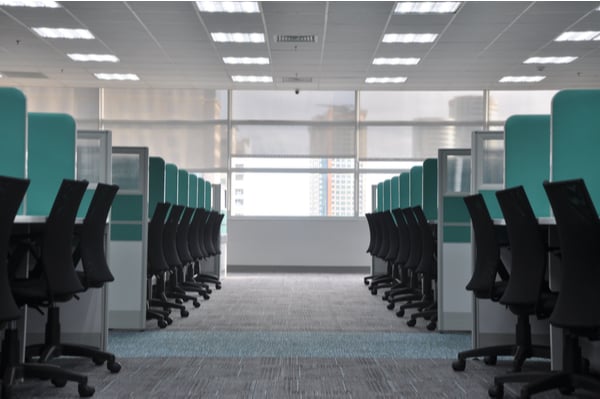How to Recognise (and Reinvigorate) a Stagnant Office Environment
Written by Chris Griffiths Wednesday 04 March 2020
As employees of differing ages fill up the modern workspace, most will work hard to overcome their varying values and experiences so that they can learn from each other and work well together. Sadly, there will always be a few people who get left behind – people who resist change and think that they know best. These are the people who perhaps struggle to learn the new skills needed in the modern workplace, preferring to stick to their tried-and-tested methods which are in their comfort zone.
What I’m really talking about here is the archetypal ‘corporate dinosaur’ – the problem with this particular office character is that in refusing to move with the times they not only stifle their own creativity, they also stifle the creativity of those working for them. The following responses are tell-tale signs that your colleague might be stuck in prehistoric times:
“If It Ain’t Broke, Don’t Fix It”
Though this is a classic and familiar phrase, it no longer applies in our modern world – with the introduction of the digital realm, everything moves faster than ever before. Staying the same won’t just limit your potential, it’ll leave you in the dust of your competitors. Colleagues who dodge change limit the new and creative ideas needed to keep the company progressing forward.
“There’s No Room for Mistakes”
Failure is a key component of success. Ultimately, “winners fail more times than losers even try” – if your colleague is unaccepting of mistakes, they are also unaccepting of big successes.
“We Need Something Tried and Tested”
This is something especially common in big organisations. The fear of misstepping prevents leaders from going for “risky” ideas, but – much like with ‘it ain’t broke don’t fix it’ – playing it safe is limiting. Breaking the mould is the best way to obtain growth and achieve ambitions.
“None of Our Competitors Are Doing That”
There is, of course, a lot to be learned from your company’s competitors – but if your business’s approach falls back on simply copying competitors then you’re never going to be able to excel past them. Trying something a competitor isn’t doing might just be the best way to get ahead.
“Why Aren’t You Working?”
As the importance of company culture has become a bigger priority, many companies have introduced facilities which put an emphasis on maintaining a healthy body and mind, with gyms and games rooms cropping up in many offices globally. The irony is, the corporate dinosaurs of the world actually challenge individuals for making use of these work benefits, showing no awareness of the value they bring to employee morale and their overall health.
“We Don’t Have Time for Daydreaming”
It’s a common misconception that daydreaming is “slacking off” – in actual fact, focused daydreaming is an important problem-solving technique that produces creative solutions. Managers who don’t allow their team to pause and let their mind wander pave the way for stressed employees lacking solutions.
“I Already Have a Great Idea”
As the French philosopher, Émile Chartier once said – “nothing is more dangerous than an idea when it’s the only one we have.” If your colleague is quick to favour their own personal idea – without exploring other options, or being open to other possibilities – they are likely engaging in ‘selective thinking’. The problem with selective thinking is that once someone has a great idea, rather than challenging it – they look to justify it, hence, ultimately, they inhibit the production of new, fresh ideas.
Take a look at our resources on ManagementDirect for templates, checklists, and webinars on how you can bring your team into the future. Log in and search for ‘team building’, for example, to be inspired.
You can also read our previously published article, “I’m not a dinosaur”: 5 ways to stay relevant in the workplace.
Image: Unsplash
Pink suits and ice-breakers: what we learned at CMI Communities Live, Birmingham
Experts gathered in the West Midlands to share their ideas for future-proofing leadership
“I haven’t finished developing – I’ve got more to offer”
Gem Fletcher launched her own business podcast and consultancy. She breaks down her commitment to ongoing development…
Why leaders must champion digital skills in Northern Ireland
Digital skills gaps present challenging questions for managers, writes Dr Steven Egan fCMgr
“The best leaders set a clear direction and empower staff”
Andrew Stephenson CMgr FCMI is an HR expert who believes in the power of employee engagement and well-trained managers
Blog
This is a space for people to stay up-to-date with all the latest knowledge, opinions and commentary on management and leadership topics from some industry leaders.
Members See More
CMI Members have access to thousands of online learning and CPD resources. Learn more about our membership benefits
Join The Community
CMI offers a variety of flexible membership solutions, tailored to your needs. Find out more and get involved in the CMI community today.
